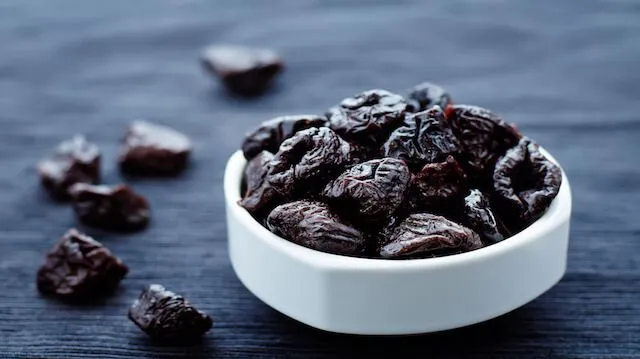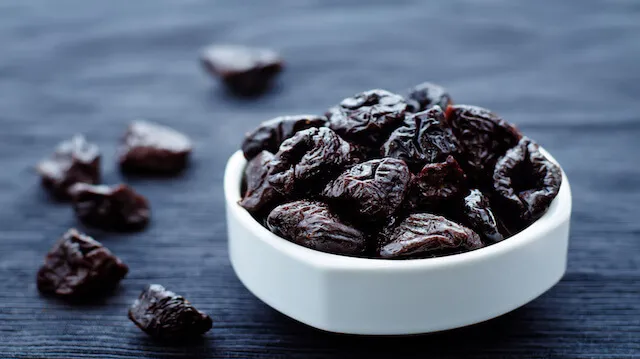
- Share on Facebook236
- Share on Pinterest
- Share on Twitter
One of the most common of health complaints has to do with irregular bowel movements and poor digestion. In a world where processed foods and sugary foods are more available and widely consumed than ever, it’s no coincidence that our food intake has negatively impacted our digestive systems.
But instead of taking harsh laxatives that actually hurt your body and can hurt your digestive tract over the long haul, just eat more of these real, whole foods that improve digestion and constipation the way nature intended.
Why not just take fiber pills and laxatives?
Laxatives trigger the colon to quickly empty its contents. Although you may end up emptying the bowel, this doesn’t resolve the wastes in the small intestine, often a problem in individuals with chronic irregularity. Laxatives can weaken the bowel and it can get “lazy,” meaning you have to regularly take laxatives just to find relief. As the bowel becomes more sluggish over time, wastes end up accumulating, which can lead to back pain, sluggishness and never having a “complete” movement. When you are regular by nature, your entire system will empty out and you won’t have diarrhea or quick, harsh movements like you do with laxatives.
Then there are the issues of chemicals used in laxatives. One of the leading ingredients in the most popular laxative, Miralax, which is said to be the safest, is known as propylene glycol. This is a petroleum product that is used to make various items, from antifreeze to brake fluid, even to forms of gasoline. It has been shown to cause mood disorders, dementia, autism, stomach pain, and more.
Along with laxatives, you’ve probably been told that you need to increase your fiber intake to treat constipation. Chalky fibers, tablets and fiber crackers are in every drugstore nationwide. The problem isn’t just that we’re avoiding fiber, it’s also that we’re lacking in whole foods. What does this mean? It means our body doesn’t know what to do with processed foods, including fiber pills, powders and supplements. The processed version may get part of the job done but these don’t fill you up, satisfy your cravings or give your body the nutrients that simple foods do. Let’s take a look at 15 whole foods that work much better!
Organic dried plums (prunes)
Perhaps the most well-known remedy for constipation is organic dried plums, or what you might know as prunes. Prune juice is also an effective remedy but doesn’t contain all the benefits that whole prunes do. Whole prunes (which are dried plums) are rich in mood-boosting benefits that enhance serotonin in the body. Since serotonin is produced in the gut, it naturally triggers regular movements as it promotes a relaxed state in the body. Prunes also contain magnesium and potassium, two critical minerals needed for regularity and a more calm state of mind. Prunes contain the natural sugar known as sorbitol as well as soluble fiber, both of which trigger bowel movements naturally, quickly and effectively. Buy organic dried plums since regular dried plums contain chemicals from processing such as sulfites or BHT.
Berries
Berries are one of the best foods for treating constipation because they contain a mix of soluble and insoluble fibers as well as potassium and vitamin C. Soluble fiber helps increase regular, whole movements while insoluble fiber moves quickly through the system helping you avoid sluggishness. Vitamin C also treats constipation by improving the rate at which food moves through the system, and potassium helps relieve high blood pressure and nervousness that can cause IBS-related constipation.
Apples
Apples contain a fiber known as pectin which moves food through the gut and removes cholesterol and toxins with it. Apples also contain natural sugars and vitamin C that effectively treat constipation. If you have sensitivities to FODMAPS and find that apples cause bloating, try unsweetened applesauce instead, which is easier for the body to break down.
Sweet potatoes
Sweet potatoes are fantastic for regularity and constipation. They are rich in magnesium, potassium, vitamin C and natural sugars that promote regularity. Their real magic comes from their ability to improve mood and enhance serotonin production in the body. Sweet potatoes relax the mood and digestive system, and their fiber helps ensure wastes move regularly through the system.
Pumpkin
Pumpkin is another powerful treatment for constipation — it’s even recommended by many vets for constipation in dogs! But we can take advantage of pumpkin’s powers on digestion too. This wonderfully low-sugar veggie/fruit is rich in soluble fiber, low in sugar and high in water. It moves through the system gently and naturally. It’s also very soft and easy for the body to breakdown. You can stir cooked pumpkin into soup, oatmeal, smoothies and much more!
Squash
Zucchini, yellow and all winter squash are also fantastic alternatives for constipation treatment! These veggies/fruits are rich in vitamin C, potassium and water, which is a powerful trio to combat constipation. Squash can help increase the speed at which food moves through the body and its fiber helps ensure full movements with a gentle effect on the system.
Beets
If you regularly eat beets, constipation will become a thing of the past, guaranteed! Beets are one of the best cleansers you can eat for a variety of reasons. They remedy constipation, enhance regularity, cleanse the liver of toxins, and keep oxygen moving through the blood. They are also high in vitamin C, magnesium, potassium, and nitric oxide to enhance brain and heart function. If you haven’t ever liked beets or tried them, I suggest roasting them in the oven. They take on a softer texture and caramelized flavor. Chop them into quarters with some sweet potatoes, place on a pan, and roast them for 45 minutes with whatever herbs you like. They’re delicious hot, or chilled the next day!
Kale
 Is there anything kale can’t do? One of its best attributes is the natural cleansing effect kale has. Kale is a powerful source of magnesium and chlorophyll. Magnesium helps soften the stool and relax the digestive system to get things moving, while chlorophyll cleanses the entire system! Kale is also rich in vitamin C, potassium, and B vitamins to promote a stronger digestive system and a happier mood. Enjoy it raw or cooked, both are great!
Is there anything kale can’t do? One of its best attributes is the natural cleansing effect kale has. Kale is a powerful source of magnesium and chlorophyll. Magnesium helps soften the stool and relax the digestive system to get things moving, while chlorophyll cleanses the entire system! Kale is also rich in vitamin C, potassium, and B vitamins to promote a stronger digestive system and a happier mood. Enjoy it raw or cooked, both are great!
Spinach
Like kale, spinach is high in B vitamins, vitamin C, magnesium and chlorophyll. It has the same benefits, but with a sweeter taste and more protein (5 grams per cup). Enjoy baby spinach in salads, cooked spinach in entrees like soup or stews, or mix a little spinach into your next green smoothie to really get things going!
Lentils
Beans are commonly known as being a high-fiber option to cure constipation. However, if you already have a backup and are sensitive to lots of fiber, stay away from beans until things get better. Instead, opt for very easy-to-digest legumes such as lentils (or green peas). Both of these options give you the same benefits as beans, but are very easy to digest and require no soaking or special prep. They also produce less gas and are very high in protein.
Wild rice
Wild rice is an aquatic grass, not a rice grain at all. It’s simple to digest, gluten-free and is one of the best foods to promote serotonin in the body. It’s also higher in fiber, iron and antioxidants than brown or black rice. Wild rice has a nutty flavor and cooks just like regular rice; it is high in potassium and is linked to better weight loss than other types of rice or grains.
Gluten-free oats or oat bran
Oats are one of the best foods you can eat to prevent constipation, but because they’re usually processed with wheat, you’ll want to choose gluten-free oats to be safe. Oats are a unique grain because they’re lower in carbs and higher in fiber and protein than all other types of grains. They’re also high in mood-boosting B vitamins, vitamin C, calcium, potassium and magnesium. Enjoy whole gluten-free oats or gluten-free oat bran. You can add these to smoothies, soak them overnight, bake with them, or cook them as a porridge. Stir in some raisins, prunes or dried figs as another weapon against constipation!
Quinoa
This protein-packed seed is fantastic not only for constipation but also for maintaining a regular system around the clock. Quinoa promotes a calm mind, contains soluble fiber to ensure regular movements, breaks down easily in the body, is gluten and grain-free, and is high in magnesium and potassium. You can cook quinoa like all other grains; choose red varieties for a sweeter flavor and white varieties for a nutty flavor.
Spirulina
Spirulina is a superfood with amazing benefits for your whole body. Let’s start with its high chlorophyll content, which cleanses the whole body of impurities starting in the bowel. Spirulina is higher in chlorophyll than any other food aside from chlorella, another super algae you can use for detoxification. Choose toxic-free spirulina since a high-quality brand will ensure it was produced in clean waters. Spirulina is also high in iron, vitamin B12, vitamin A and potassium. You can take it in tablet form, or add spirulina powder to smoothies to mask its taste.
Seeds (chia, flax, pumpkin, hemp, sunflower, sesame)
All seeds are great for digestion and are easier on the system than nuts (which can be a bit heavy on an already full system). Some of the best seeds to treat constipation are flax, hemp, pumpkin and chia seeds. These seeds are small and easy for the body to break down, and they’re very high in fiber and magnesium. Hemp, chia and pumpkin seeds are a great source of chlorophyll, iron, magnesium and omega-3 fats. Flax is also high in omega-3 fats, which is part of the reason it is known as one of the best foods to treat constipation. Sesame seeds and sunflower seeds are good options too.
The best way to take advantage of these foods is to work them into simple meals each and every day. Think about your meals and how you could replace some unhealthy choices with simple, whole foods like those mentioned here. Do you have any recipe ideas using these delicious foods?
—The Alternative Daily
Sources:
http://www.ncbi.nlm.nih.gov/pubmed/25223576
https://www.gutsense.org/gutsense/the-role-of-miralax-laxative-in-autism-dementia-alzheimer.html
http://ajcn.nutrition.org/content/early/2014/08/06/ajcn.114.089151.abstract
- Share on Facebook236
- Share on Pinterest
- Share on Twitter

